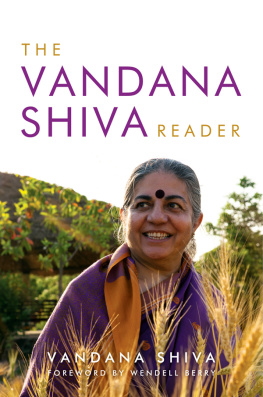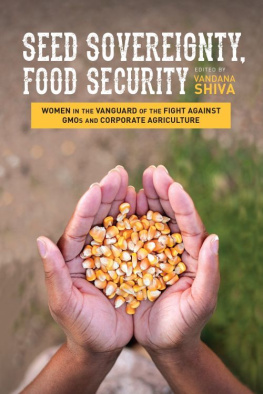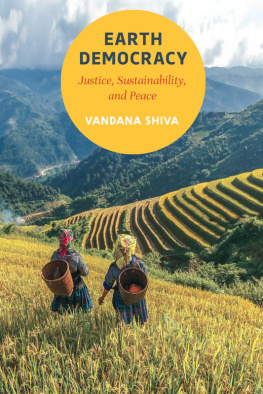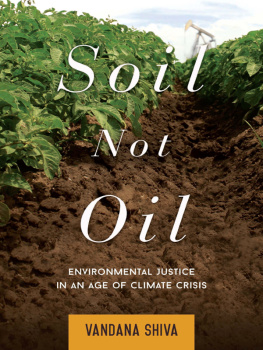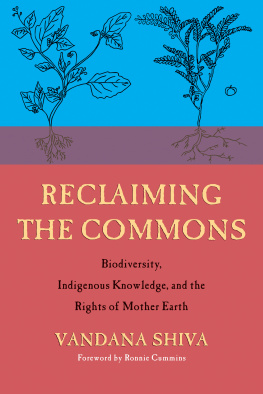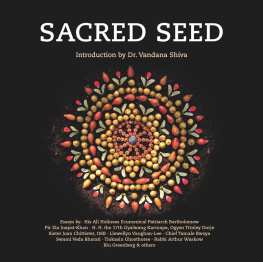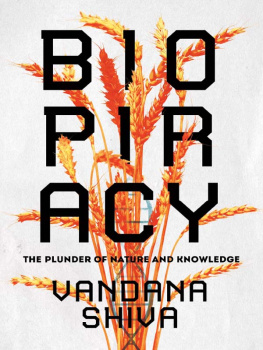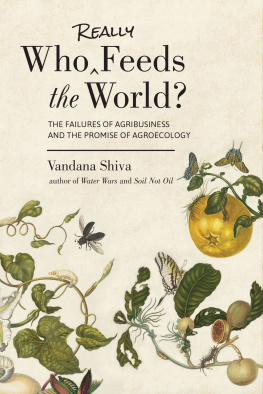
The Vandana Shiva Reader
THE VANDANA SHIVA READER
VANDANA SHIVA
Foreword by
WENDELL BERRY

Due to variations in the technical specifications of different electronic
reading devices, some elements of this ebook may not appear
as they do in the print edition. Readers are encouraged
to experiment with user settings for optimum results.
Copyright 2014 by Vandana Shiva
Foreword copyright 2014 by Wendell Berry
Published by The University Press of Kentucky
Scholarly publisher for the Commonwealth, serving Bellarmine University, Berea College, Centre College of Kentucky, Eastern Kentucky University, The Filson Historical Society, Georgetown College, Kentucky Historical Society, Kentucky State University, Morehead State University, Murray State University, Northern Kentucky University, Transylvania University, University of Kentucky, University of Louisville, and Western Kentucky University.
All rights reserved.
Editorial and Sales Offices: The University Press of Kentucky
663 South Limestone Street, Lexington, Kentucky 40508-4008
www.kentuckypress.com
Figures by Dick Gilbreath
Library of Congress Cataloging-in-Publication Data
Shiva, Vandana, author.
The Vandana Shiva reader / Vandana Shiva ; foreword by Wendell Berry.
pages cm. (Culture of the land)
Includes bibliographical references and index.
ISBN 978-0-8131-4560-0 (hardcover : alk. paper)
ISBN 978-0-8131-5329-2 (pbk. : alk. paper)
ISBN 978-0-8131-4699-7 (pdf : alk. paper)
ISBN 978-0-8131-4698-0 (epub : alk. paper)
1. Shiva, Vandana. 2. Agricultural literature. I. Title. II. Series: Culture of the land.
S494.5.A39S45 2015
630dc23 2014043937
This book is printed on acid-free paper meeting the requirements of the American National Standard for Permanence in Paper for Printed Library Materials.

Manufactured in the United States of America.

| Member of the Association of American University Presses |
Contents
by Wendell Berry
Foreword
Wendell Berry
I count it a privilege and a pleasure to be Vandana Shivas friendnot least because, as her friend, I am spared the pain and suffering that she bestows upon her enemies. Her enemies are the radical oversimplifiers, the colonizers, of the global industrial corporations and their for-hire experts; the complacent, the indifferent, the inert; and the do-gooders who think that any version or device of technological progress is a charity.
Her advocacy for many years has been the defense of the local through a global alliance. Nobody better represents that possibility or has done more to promote it. In support of her friends and allies in that necessary effort, she has probably spent more time in the air than most aviators. She has been an indispensable ally: devoted, smart, informed, tireless, and fearless.
Her great virtue as an advocate is that she is not a reductionist. Her awareness of the complex connections among economy and nature and culture preserves her from oversimplification. So does her understanding of the importance of diversity.
Like many people, she is against monoculture in farming. Like too few, she knows how monocultures on the land proceed from monoculture in the mind. Mental monoculture is the typical product of the modern university. Ananda Coomaraswamy was thinking of this when he said that people who spend four years in getting a good university education must then spend forty years in getting over it.
I said that Vandana is smart, and I think that is the right word for her. But I need to be more exact. Beyond what now passes for education, she has the experience, the good sense, and the formal intelligence necessary to understand both the complex local structures of traditional farming and forestry and the necrotic ramifications of global industrialism.
The impulse of her work comes, as we might expect, from her profound sympathy with the diverse small farmers of the third world, the majority of whom are women. But let us remember that the farm and forest landscapes of the developed nations are suffering the same colonialism as the third world. The subjection is everywhere the same, and with the same global purpose of making producers and consumers completely the hostages of corporations supplying seed, chemicals, machines, and fuel. Vandana has understood this industrial totalitarianism exactly, and she speaks for us all.
Introduction
From Quanta to the Seed
An Unpredictable Journey
Physics was my passion and my chosen profession. In school I received the Science Talent Scholarship, which gave me the opportunity to train in Indias leading scientific institutions. I trained to be a nuclear physicist in the Baba Atomic Research Centre, but moved to theoretical physics when my sister Mira, a medical doctor, made me aware of nuclear hazards. I realized then that most science is partial. I wanted to practice a holistic science and was drawn to quantum theory for its nonreductionist, nonmechanist paradigm.
Before leaving for Canada to do my PhD in the foundations of quantum theory, I wanted to visit my favorite places in the Himalaya where I had grown up. But the forests and streams had disappeared: the rich oak forests, which absorb the monsoon rains to release the water slowly as streams, had been cut down in the insane rush to build dams and roads, and to grow apples.
In looking for a way to deal with this personally experienced loss, I become a volunteer for the Chipko Movementthe movement to embrace trees to prevent their being cut. Every vacation from 1974 to 1981 found me back in the Himalayan village of Tehri Garhwal and often in the ashram of Bimla and Sunderlal Bahuguna, Gandhians who played a leading role in supporting the women who had spontaneously started the movement. By 1981 the government was forced to recognize the wisdom of Chipkothat the primary products of the forest are soil, water, and pure air, not timber, resin, and revenues. Logging was banned in the Himalaya above one thousand meters.
Though I had grown up in the forests of the Himalaya, it was the Chipko Movement that awakened my ecological consciousness and made me deeply aware of the relationship between ecological destruction and the creation of poverty. I often say that I have learned my ecology in Chipko University, with ordinary peasant women as my teachers. Staying Alive was born of those teachings. One of the slogans that emerged from Chipko was that forestry should shift from commercial forestry to social forestryin the service of nature and society.
I returned to India after receiving my PhD because I wanted to give back to my society and also understand it better. It would have been easy to get a tenure-track position in a North American university, but I chose the more difficult and challenging path of trying to combine scientific research with social and ecological responsibility.
In 1980, while I was at the Indian Institute of Management (IIM) in Bangalore, we witnessed the conversion of farmlands around the city into monocultures of eucalyptus plantations. In trying to understand what was driving this, we found the World Bank was financing eucalyptus plantations for the pulp industry, calling it social forestry. Ecological Audit of Eucalyptus,
Next page
